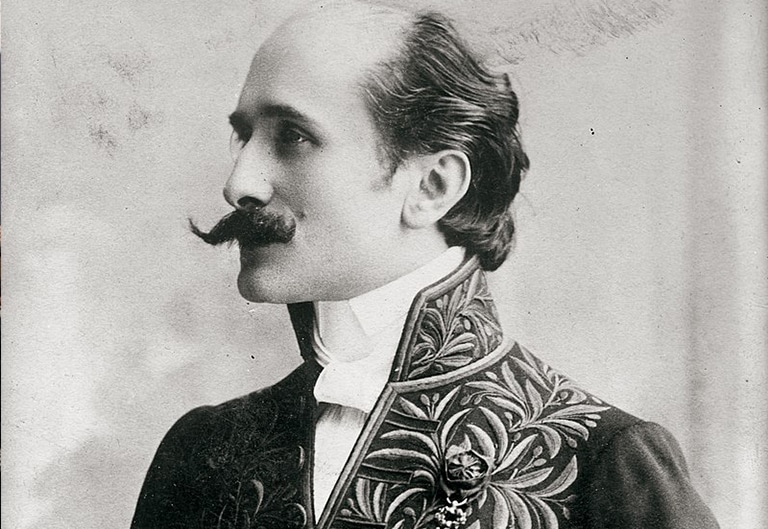Rostand’s subsequent play, La Samaritaine, was written for renowned French actress Sarah Bernhardt, but it received criticism due to one of the characters being Christ, albeit a minor one.
Table of Contents
Who is Edmond Rostand?
Edmond Rostand was a French poet and playwright, born in Marseilles, France, on April 1, 1868. He is most famous for his play “Cyrano de Bergerac,” which was first produced in 1897 and is considered one of the greatest works of French literature. Rostand began his career as a poet and his first volume of poems was published in 1890. His first play, “Les Romanesques,” was produced in 1894, followed by “La Princesse Lointaine” in 1895 and “La Samaritaine” in 1897. “Cyrano de Bergerac” was produced in the same year and was a huge success, making Rostand one of the most celebrated playwrights of his time. Rostand continued to write plays, poems, and essays until his death in 1918.
RELATED: Who is Kuroda Seiki? All About Japanese Painter (1866-1924)
Edmond Rostand was a French Poet And Dramatist

Known for his association with neo-romanticism, Edmond Rostand is most famous for his play “Cyrano de Bergerac”. His romantic plays offered a contrasting style to the prevalent naturalistic theatre of the late 19th century. “Les Romanesques”, one of Rostand’s works, was adapted into the popular musical comedy “The Fantasticks”. In addition to his success as a playwright, Rostand also earned the distinction of being the youngest writer to be elected to the Académie Française.
Edmond Rostand’s Personal Life
Edmond Rostand’s personal life was marked by unhappiness, and like many in the theatre world, he had mistresses. Among his close friends was Anna de Noailles, a poet who spent most of her free time in her bedroom. In 1901, at the age of 33, Rostand was elected to the Académie Française, but he struggled to cope with his newfound fame and the unwanted publicity it brought. Suffering from poor health, he retreated to his family’s estate in Cambo-les-Bains in the Basque county, away from the frenzy of Paris. He would take walks every morning, jotting down ideas and lines of poetry in a small notebook. Although he continued to write plays and poetry, his subsequent works did not attain the same level of popularity as Cyrano de Bergerac.
Rostand’s play Chantecler, an allegory from the animal world of La Fontaine about a barnyard rooster who believes his song makes the sun rise, was considered a failure. In Emma Goldman’s commentary on the play, she saw the character of the blackbird as representing a modernity that was superficial and devoid of poetic vision.

Rostand spent his retirement in the luxurious villa Arnaga, which he had designed with architect Albert Tournaire. While directing rehearsals for L’Aiglon at the Théâtre Sarah Bernhardt, he contracted influenza, which turned into double pneumonia. He had great difficulty breathing, but when an oxygen cylinder was brought in, he said, “It’s a little soon.” Rostand died in Paris on December 2, 1918, and was buried at the Cimetière de Saint Pierre beside his parents.
According to Sue Lloyd’s biography, The Man Who Was Cyrano, the success of Cyrano de Bergerac was a turning point in Rostand’s life, but it also became a crushing burden from which only death released him. The biography provides new information about the background of the play. A Broadway musical version of Cyrano, called Cyrano and composed by Michael Lewis, was produced in 1972 to make the play more appealing to American theatre audiences.
RELATED: Who is Doris Pilkington Garimara? Australian Author(1937 – 2014)
Edmond Rostand’s Remarkable Works
Edmond Rostand is best known for his play Cyrano de Bergerac, but he wrote other plays and works of poetry as well. Some of his other notable works include:
- Les Romanesques (1894)
- La Princesse Lointaine (1895)
- La Samaritaine (1897)
- Chantecler (1910)
- Le Vol de la Marseillaise (1917)
He also wrote several volumes of poetry, including:
- Les Musardises (1876)
- Les Vœux de la mer (1891)
- La Dernière Nuit de Don Juan (1921, published posthumously)
Edmond Rostand’s Cause of Death
Edmond Rostand died of double pneumonia, which was a complication of influenza. He had contracted the illness while directing rehearsals for his play L’Aiglon at the Théâtre Sarah Bernhardt in Paris. Despite his deteriorating condition, Rostand continued to work until he became seriously ill and was hospitalized. He passed away on December 2, 1918, in Paris at the age of 50.













